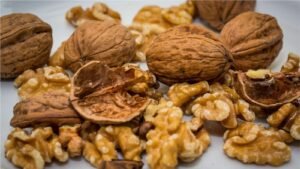Health and Sexual Benefits of Dark Chocolate: Consensus has established that dark chocolate, because of its nutritional value and antioxidant content, is an esteemed nutrient that imparts an abundance of health advantages over milk and white chocolate.
“Cacao contains more antioxidants than green tea or red wine,” asserts the expert. “Dark chocolate contains more antioxidants, but you should strike a balance between eating it and enjoying its health benefits.”
A bar containing 70% cacao or more is the best option, according to the Harvard T.H. Chan School of Public Health; bars with lower cacao percentages contain more added sugar and unhealthy lipids. Good dark chocolate is not only a healthier alternative to milk chocolate, but it is also chocolate, which means it is high in calories and saturated fat. To prevent weight gain, Amidor advises consuming no more than one ounce (oz) of dark chocolate per day.
Health and Sexual Benefits of Dark Chocolate: Rich in nutrients
Quality dark chocolate with a high cocoa content is healthy.
A good source of soluble fiber and minerals.
A 100-gram, 70–85% cocoa dark chocolate bar contains:
- 11 grams of Fiber
- 66% Iron
- 57 percent Magnesium
- 196% of Copper and 85% of Manganese
- It also contains Potassium, Phosphorus, Zinc, and Selenium.
National Dark Chocolate Day 2024 (US): Celebrate with Exciting Activities, and Fascinating Facts
Dark chocolate may aid in the prevention of heart disease and stroke
- Researchers emphasize that one of the main advantages of dark chocolate may be its potential benefit to cardiovascular health. A comprehensive review and meta-analysis found that consuming dark chocolate once per week decreased the risk of obstructed arteries by 8%. Consuming approximately 1 ounce of chocolate regularly was associated with a reduced risk of coronary artery disease, according to another study that analyzed data from more than 188,000 veterans.
- “Cacao contains more antioxidants than red wine or green tea,” asserts the expert. “Dark chocolate contains more antioxidants, but you should strike a balance between eating it and enjoying its health benefits.”
- A bar containing 70% cacao or more is the best option, according to the Harvard T.H. Chan School of Public Health; bars with lower cacao percentages contain more added sugar and unhealthy lipids.
- Good dark chocolate is not only a healthier alternative to milk chocolate, but it is also chocolate, which means it is high in calories and saturated fat. To prevent weight gain, Amidor advises consuming no more than one ounce (oz) of dark chocolate per day.
Should dark chocolate be eaten before sex?
- Naturally, chocolate and romance go together. This delicious treat releases serotonin, which boosts libido by promoting contentment.
Traditional aphrodisiac cocoa is close. - Chocolate contains serotonin and phenylethylamine, modest aphrodisiacs, and mood enhancers, although their health effects are less well known. Your intimacy goes deeper.
- Dark chocolate’s caffeine and flavonoids boost blood flow and libido. Scientific research shows that dark chocolate on the tongue stimulates pulse rate and brain activity as much as passionate kissing.
- None of this proves chocolate works. Choose unadulterated dark chocolate for these benefits. Choose sugar-free or low-sweet dark chocolate to reap the benefits without the calories.
Eating Dark Chocolate helps Elevate Mood, Prevent Memory Lapses, and Enhance Cognitive Abilities
- You are not using your imagination for this. According to research, ingesting dark chocolate containing a high percentage of cacao (70 percent, for instance) may benefit the brain. According to research, chocolate increases neural activity in regions of the brain associated with pleasure and reward, which reduces stress and improves mood.
- Numerous studies have examined the specific ramifications of chocolate on the brain. Consumption of 48 grams (g), or slightly more than 1.5 oz, of organic chocolate containing 70% cacao increased neuroplasticity, or the capacity of the brain to form new synaptic connections, according to one such study. There is potential for this capability to positively impact temperament, memory, and cognition.
- Chocolate consumption may enhance memory and learning, according to a separate study, because it has been demonstrated that the flavonoids, potent plant components found in cacao beans, concentrate in the regions of the brain that regulate these functions. Further research has established a correlation between the consumption of dark chocolate and a reduced likelihood of developing clinical depression.
National Chocolate Cake Day 2024: Celebrating the Importance of Chocolate Cake
Dark Chocolate Might Improve Blood Sugar Levels and Reduce the Risk of Diabetes
- Chocolate may not prevent diabetes, but evidence suggests that moderate consumption of cacao-rich dark chocolate as part of a balanced diet may help glucose metabolism. Research shows that type 2 diabetes is characterized by insulin resistance and high blood glucose.
- Scientists found that dark chocolate flavonoids reduce oxidative stress, the main cause of insulin resistance. Insulin sensitivity increases, thereby decreasing resistance and the likelihood of developing conditions such as diabetes.
- Individuals who consumed dark chocolate on an infrequent basis were nearly twice as likely to develop the disease five years later as those who did so at least once per week, according to another study.
- While scientists agree that dark chocolate offers a multitude of health benefits, further investigation is necessary to ascertain whether there is a causative relationship between chocolate consumption and the risk of developing diabetes.
Chocolate Might Promote Weight Loss and Is Gut-Friendly
- Although incorporating dark chocolate into one’s daily diet may appear to be an extreme measure in the context of weight management, research suggests that it may aid in appetite regulation, thereby potentially facilitating weight loss. Will Clower, Ph.D., a neuroscientist, describes in his book Eat Chocolate, Lose Weight how consuming a tiny piece of dark chocolate before or after a meal stimulates the release of hormones that signal to the brain when an individual is full.
- During digestion, chocolate functions as a prebiotic—a type of fiber that stimulates the development of beneficial bacteria in the gut—according to research. Prebiotics and probiotics are not synonymous. According to the Harvard T.H. Chan School of Public Health, the number of “good” microorganisms in your system is positively correlated with your body’s ability to assimilate nutrients and maintain a balanced metabolism.
- A different study suggests that milk chocolate may aid in weight loss through the stimulation of the metabolism and the suppression of appetite. The sample size of the participants was limited to 19 women, indicating that further research is necessary to substantiate the results. Additionally, keep in mind that chocolate, especially milk chocolate, is high in calories and should be consumed in moderation; increasing your intake will not improve your health.
15 Romantic Movies to Watch on Valentine’s Day at Home
It Protects Against Free Radicals and May Aid in Cancer Prevention
- Dark chocolate may prevent some cancers, despite the lack of evidence. Scientific research shows that antioxidants protect cells from free radicals and unstable oxygen molecules. Disease and aging include free radicals.
- Dr. DuBost says extra-free radicals cause cellular damage, which can lead to low-grade inflammation and diseases including Alzheimer’s, cancer, and cardiovascular disease.
- The American Cancer Society recommends a diet high in flavonoids, like chocolate, to avoid cell damage, which commonly precedes cancer. Epicatechin, one of the many flavonoids in chocolate, is thought to prevent cancer.
- The amount of chocolate needed to potentially prevent cancer is much higher than the recommended daily dose for people, and most studies on this topic are limited to animal or cell culture models.
Unique Gift Ideas for Rose Day: Beyond Roses, Explore Other Flowers and Gifts
Dark Chocolate Might Increase Beneficial Cholesterol While decreasing harmful Cholesterol
- A study discovered that giving overweight and higher weight participants a fistful of almonds, dark chocolate, and unsweetened cocoa resulted in a significant reduction in their levels of low-density lipoproteins (LDL), or “bad” cholesterol. This finding is consistent with the marketing of dark chocolate as a food that reduces cholesterol.
- DuBost posits that the cocoa butter present in dark chocolate might potentially elevate levels of high-density lipoproteins, commonly referred to as “good” cholesterol. Oleic acid, a monounsaturated lipid that is present in heart-healthy olive oil, is also found in cocoa butter, per MedlinePlus.
- However, cocoa butter contains a higher concentration of saturated fat than olive oil, which, according to the U.S. Department of Agriculture (USDA), is harmful to the heart if consumed in excess. This underscores the significance of regulating portion proportions.
- “It is premature to declare chocolate a panacea for cholesterol,” DuBost continues, “because many of the studies on chocolate and good cholesterol have been conducted in a short time frame.”
Tasty and Healthy Dark Chocolate
- Notwithstanding the health and sexual benefits of dark chocolate, one thing is certain: dark chocolate is an excellent source of nutrients. Naturally, chocolate with a darker color is preferable; however, a study indicates that chocolate with a darkness of at least 70% contains fiber, potassium, calcium, magnesium, and potassium.
- Additionally, it is high in calories and fat, so be mindful of your daily consumption. Additionally, each chocolate brand utilizes a unique manufacturing process. Amidor asserts that opting for organic alternatives is invariably superior due to the absence of hazardous pesticides and fertilizers during cultivation (seek out products bearing the Rainforest Alliance certification).
- To ensure that the chocolate you consume contains fewer and more natural ingredients, she further recommends that you consistently examine the ingredient list.
Valentine’s Day 2024: History, FAQs and Global Celebration of Love











